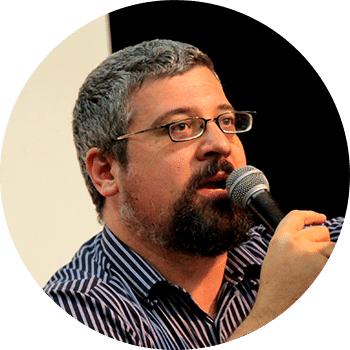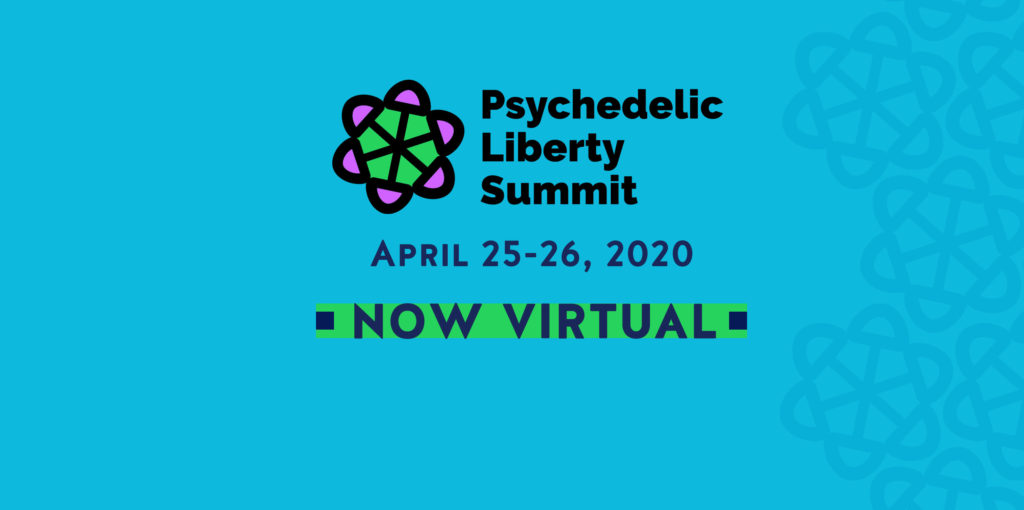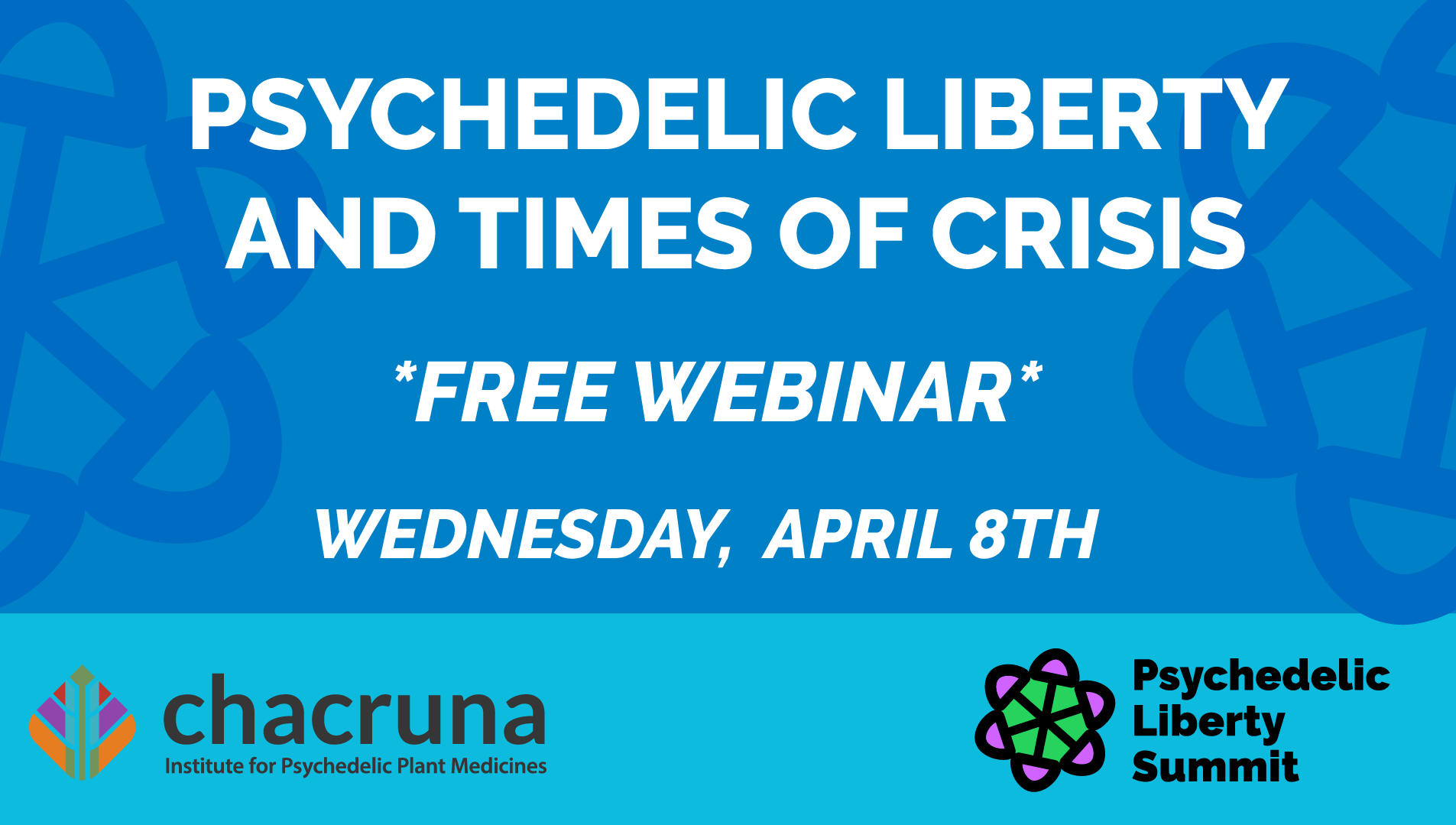April 8th, 2020, 12 pm to 2pm
Join members of the Chacruna leadership team for a free webinar on Wednesday, April 8th at 12pm. We will discuss the role of psychedelics and plant medicines in helping make sense of the current global pandemic, and explore what the future social, political and cultural systems might look like as we attempt to integrate these powerful tools into a rapidly-changing and uncertain future. This event will serve as a preview for some of the content that will be explored on April 25th and 26th at the Psychedelic Liberty Summit, where dozens of thought leaders and visionaries from around the world will come together to discuss the future of psychedelic practices, including decriminalization, legalization, medicalization, commodification and access.
Join our Meetup Group to stay informed about upcoming local events!
Featured Speakers:

Brad Bartlett is a seasoned attorney with a long career as a business lawyer, litigator, legal and policy advisor, and law professor and lecturer. Brad pioneers legal strategies and services for the cannabis industry; handles complex land-use and environmental matters; and advises American Indian Tribes and tribal communities on governmental, regulatory and business matters. Brad recently served as senior attorney at McAllister Garfield, P.C., a prominent cannabis business law firm, and before that served as an assistant professor at the University of Denver’s Sturm School of Law in the Environmental and Natural Resources Law Program. Over his extensive career, Brad has worked with impacted tribal communities, including Native American Church members, on a wide variety of complex tribal and environmental justice matters. Brad is also a seasoned litigator and has brought numerous cases in the public interest addressing government accountability and overreach. Brad graduated the University of Colorado School of Law’s environmental and American Indian law program in 1998 and is an enrolled tribal member of the Sault Ste. Marie Band of Chippewa Indians of Michigan. Brad is a member of Chacruna’s Council for the Protection of Sacred Plants where he works to advance the dialogue around Controlled Substances Act prohibitions on psychoactive plants and its intersection with state’s rights and religious and medical freedoms.

Dr. Alex Belser is a licensed psychologist and psychedelic researcher at Yale University and New York University. His research with psilocybin and MDMA focuses on developing psychedelic treatments to treat depression, anxiety, obsessive-compulsive disorder, addiction, and trauma. Dr. Belser is the Co-Investigator of a study investigating psilocybin-induced neuroplasticity in the treatment of major depression at Yale. He also serves as the Co-Investigator of a study investigating the neural correlates of the effects of psilocybin in OCD. In 2006, Dr. Belser was a founding member of the Psychedelic Research Group at New York University, and he is a qualitative researcher on NYU’s Psilocybin Religious Leaders Study. He is study therapist for the MAPS Phase 3 trial of MDMA-assisted psychotherapy for the treatment of severe PTSD. Dr. Belser completed his clinical and research training in psychology at Bellevue Hospital, New York Psychiatric Institute at Columbia University Medical Center, and Mount Sinai Beth Israel Hospital. He is a graduate of Georgetown University, New York University, and the University of Cambridge. His practice website is https://www.centerforbreakthroughs.com/ and his website site is: http://alexbelser.com/

NiCole T. Buchanan, Ph.D., is an Associate Professor of Psychology at Michigan State University and Clinical Director and Founder of Alliance Psychological Associates, PLLC in East Lansing, MI. She is a member of Chacruna’s Racial Equity and Access Committee and a trainee in the MAPS MDMA-assisted psychotherapy training for communities of color and anticipates offering MDMA-assisted psychotherapy when clinical trials are completed. Dr. Buchanan is a fellow of the Association for Psychological Science, four separate divisions of the American Psychological Association, and has received numerous national and international awards for her research, teaching, clinical work, and professional service. She is an accomplished speaker, writer, and scholar with more than 70 journal articles, book chapters, and research reports, and her work has been highlighted in hundreds of media outlets, including CBS News, the Huffington Post, and Essence Magazine, and she has been a featured speaker for several programs, including TEDx and National Public Radio (NPR).

Clancy Cavnar has a doctorate in clinical psychology (Psy.D.) from John F. Kennedy University in Pleasant Hill, CA. She currently works in private practice in San Francisco, and is Co-Founder and a member of the Board of Directors of the Chacruna Institute for Psychedelic Plant Medicines. She is also a research associate of the Interdisciplinary Group for Psychoactive Studies (NEIP). She combines an eclectic array of interests and activities as clinical psychologist, artist, and researcher. She has a master of fine arts in painting from the San Francisco Art Institute, a master’s in counseling from San Francisco State University, and she completed the Certificate in Psychedelic-Assisted Therapy program at the California Institute of Integral Studies (CIIS). She is author and co-author of articles in several peer-reviewed journals and co-editor, with Beatriz Caiuby Labate, of eight books. For more information see: http://neip.info/pesquisadore/clancy-cavnar

Ariel Clark is a founding partner of Clark Howell LLP, a women-owned and run law firm focused on the cannabis and hemp industries. The firm represents established and emerging cannabis businesses across the supply chain and provides advice on corporate governance, financing, business transactional matters, entity formation and operation, and local and state permitting and regulatory compliance. She has served in leadership in a variety of drug policy reform and cannabis and hemp business organizations including the Los Angeles Cannabis Task Force, Cannabis Business Council of Santa Barbara County, California Native American Cannabis Association, California Grower’s Association, and California NORML. Ariel has received many kind distinctions; she was named by Rolling Stone as one of 18 “women shaping the culture of tomorrow,” as one of the top 75 “most important women in cannabis” by Cannabis Business Executive, 30 “most powerful litigators” by MG Magazine, by National Law Journal with a Trailblazer award, and was included in Entrepreneur’s “top 100 cannabis leaders” in 2018. Ariel is very honored to be a member of Chacruna’s Council for the Protection of Sacred Plants.

Kat Conour is a psychotherapist, facilitator, and experiential educator currently being trained in Ketamine Assisted Psychotherapy and with MAPS to become an MDMA for PTSD therapy provider through Sage Integrative. With a background in non-profits, philanthropy, corporate consulting, and community organizing, Kat is passionate about supporting individuals and organizations in the psychedelic community turn their values and vision into aligned action. An Emergent Strategy fangirl, Kat recognizes that a movement is only as strong as the relationships upon which they are built. She currently serves as an Advisor to Auryn Fund which recently launched We Will Call It Pala, and focuses on ensuring that equity, ethics, and accessibility are embedded in practice within the scaling of psychedelic medicines. She also sits on the Advisory Board of the Chacruna Institute for Psychedelic Plant Medicines.

Erik Davis is an author, podcaster, award-winning journalist, and independent scholar based in San Francisco. His wide-ranging work focuses on the intersection of alternative religion, media, an the popular imagination. He is the author, most recently, of High Weirdness: Drugs, Esoterica, and Visionary Experience in the Seventies (2019) and performed the audiobook as well. He also wrote Nomad Codes: Adventures in Modern Esoterica (2010), The Visionary State: A Journey through California’s Spiritual Landscape (2006), a short critical volume on Led Zeppelin (2005), and the cult classic TechGnosis: Myth, Magic, and Mysticism in the Age of Information (1998). Erik’s scholarly and popular essays on music, technoculture, and spirituality have appeared in scores of books, magazines, and journals, and his writing has been translated into a dozen languages. Davis been interviewed by CNN, the BBC, public radio, and the New York Times. He graduated magna cum laude from Yale University, and earned his PhD in religious studies at Rice University. Erik sits on the Advisory Board of the Chacruna Institute for Psychedelic Plant Medicines.

Rob Heffernan is an independent researcher and activist who has been involved in the vegetalismo, Santo Daime and other syncretic traditions since 2000. He has been involved with legal issues and organizing efforts in the Santo Daime and ayahuasca community for the last 12 years and has recently begun to speak and write about these matters publicly. He is part of Chacruna’s Council for the Protection of Sacred Plants. He is involved with integration work as a certified Shamanic Breathwork facilitator and a certified Integrative Sound and Music Practitioner (sound healing). This is complimented by a long term involvement with Buddhist Dharma. He has recently begun to write and speak about the integration of Buddhist Dharma and medicine work.

Dr. Beatriz Caiuby Labate (Bia Labate) is a queer Brazilian anthropologist who immigrated to the U.S. in 2017. She has a Ph.D. in social anthropology from the State University of Campinas (UNICAMP), Brazil. Her main areas of interest are the study of plant medicines, drug policy, shamanism, ritual, and religion. She is Executive Director of the Chacruna Institute for Psychedelic Plant Medicines (https://chacruna.net), an organization that provides public education about psychedelic plant medicines. She is Adjunct Faculty at the East-West Psychology Program and at the Integral and Transpersonal Program at the California Institute of Integral Studies (CIIS) in San Francisco. She is also Public Education and Culture Specialist at the Multidisciplinary Association for Psychedelic Studies (MAPS). She is co-founder of the Interdisciplinary Group for Psychoactive Studies (NEIP) in Brazil, and editor of NEIP’s website (http://www.neip.info), as well as editor of the Mexican blog Drugs, Politics, and Culture (http://drogaspoliticacultura.net). She is author, co-author, and co-editor of twenty-one books, two special-edition journals, and several peer-reviewed articles (http://bialabate.net).

Sean McAllister is one of nation’s leading drug policy reform lawyers. In 2004, after working for the Colorado Attorney General’s Office for several years, Sean opened a solo law practice focused on criminal defense and represented hundreds of people charged with state and federal drug crimes. That same year, he founded the drug policy reform non-profit Sensible Colorado. Sean served as the chair of the Board of Directors of Sensible Colorado while the organization co-chaired the Colorado recreational marijuana legalization campaign that voters passed in 2012. Sean has also worked on broader drug policy reform issues as a member of the Colorado Commission on Criminal and Juvenile Justice. Today, Sean’s law firm, McAllister Garfield, P.C., has 20 lawyers in four states working primarily on cannabis business law and licensing matters. As part of his work, Sean’s firm has sued regulators numerous times under the administrative procedures act, petitioned the DEA to reconsider a harmful CBD rule, and represented Native America Tribes attempting to participate in the cannabis and hemp industries. In addition to cannabis, Sean has consulted with the Decriminalize Denver campaign, which is the first ballot initiative in the U.S. designed to remove criminal penalties for the possession of psilocybin. Sean is a member of Chacruna’s Council for the Protection of Sacred Plants.

Bob Otis is a co-founder and Board Member of the Decriminalize Nature group responsible for entheogen decriminalization in Oakland CA and is a member of Chacruna’s Council for the Protection of Sacred Plants. He is a long time steward of Oakland’s Sacred Garden Community and leads clinical and molecular informatics projects by day. Bob has enjoyed growing sacred plants and exploring sacred plant traditions independently and under recognized mentorship for over 30 years. Lifetime interest in diverse cultures and wisdom traditions was complemented by his Tennessee family’s medical, religious, and wild-crafting traditions. Family medical and ecological work in Asia, Central and South America exposed Bob to non-Western healing traditions at an early age. Transformative personal and group experiences with sacred plants and materials guide his passion for working with what he considers to be plant sacraments. Following Psychology and Religious studies degrees from University of California Santa Cruz, Bob earned a Masters degree in Divinity from University of Chicago. Post-graduate cognitive science research at New York University led to professional work in epistemology and life science informatics. In addition to sacred plant learning, teaching and conservation through gardening, Bob’s passions include epistemology, bicycling, and playing his Grandma’s violin. Bob is committed to growing respectful access to traditional plant sacraments and to their newly recognized relatives. He recognizes these plants as healing sacraments, properly venerated by ancient, living and emerging syncretic traditions.

Sidarta Ribeiro is Full Professor of Neuroscience and Vice-Director of the Brain Institute at the Universidade Federal do Rio Grande do Norte. He holds a Bachelor’s degree in Biology from the Universidade de Brasília (1993), a Master’s degree in Biophysics from the Universidade Federal do Rio de Janeiro (1994) and a Ph.D. in Animal Behavior from the Rockefeller University (2000), with post-doctoral studies in Neurophysiology at Duke University (2005). Has experience in neuroethology, molecular neurobiology, and systems neurophysiology, with an interest in the following subjects: memory, sleep, and dreams; neuronal plasticity; vocal communication; symbolic competence in non-human animals; computational psychiatry; neuroeducation; psychedelics and drug policy. Director of the Brazilian Society for the Progress of Science in the biennium 2018/2019. From 2009-2011, served as Secretary of the Brazilian Society for Neuroscience and Behavior. From 2011-2015 he served as Chair of the Brazilian Regional Committee of the Pew Latin American Fellows Program in the Biomedical Sciences, and since 2011 he is a member of the Steering Committee of the Latin American School for Education, Cognitive and Neural Sciences (LA School). Senior research associate of the FAPESP Research Centre for Innovation and Diffusion in Neuromathematics. Scientific Coordinator and Member of the Advisory Board of the Brazilian Platform for Drug Policy and the Chacruna Institute for Psychedelic Plant Medicines. Sidarta Ribeiro is greatly interested in the study of the neural bases of consciousness and its alteration, including investigation of the ayahuasca experience. He is also involved in the public debate on the medicinal uses and the legalization of cannabis in Brazil.

Sophia Rokhlin MSc is an anthropologist and author whose work focuses on psychoactive plants, human rights and environmental change. She is the author ofWhen Plants Dream: Ayahuasca, Amazonian Shamanism and the Global Psychedelic Renaissance (Watkins, 2019) which explores the legal, social and ethical aspects of the global ayahuasca boom. She is a Program Coordinator at the Chaikuni Institute, a nonprofit in the Peruvian Amazon supporting regenerative agriculture and the sustainable cultivation of ayahuasca. She is a member of Chacruna’s Ayahuasca Community Committee.

Rebekah Senanayake (Bek) is currently working towards her Masters in Cross-Cultural Psychology and holds a Bachelor of Science with a double major in Cultural Anthropology and Psychology from Victoria University of Wellington, New Zealand. Interested in the social and cultural role of plant medicines, Bek seeks to investigate the symbolic position of the medicines and healers within society. Her other research interests include improving diversity relationships within organisations and their outputs. Bek first discovered her interest in ayahuasca in 2015 when travelling through the Peruvian Amazon, and since then has gone on to undertake ethnographic research in the jungle. She is the social media director of the Chacruna Institute for Psychedelic Plant Medicines, and carefully curates Chacruna’s social media platforms to provide accurate and engaging information on psychedelics and culture whilst centering the voices of minority groups frequently excluded from psychedelic discourse.

Glenn H. Shepard Jr. is an ethnobotanist, medical anthropologist and filmmaker who has worked with diverse indigenous peoples of Latin America, especially in Amazonia. He earned his undergraduate degree at Princeton University and completed his doctorate in Medical Anthropology at the University of California at Berkeley in 1999. His research interests include ethnobotany, medical anthropology, shamanism, sustainable resource management, visual anthropology and the territorial rights of isolated peoples. Publications include research articles, commentary and reviews in Nature (1998, 2009), Science (2003), Science Advances (2016), American Anthropologist (2004, 2012), Economic Botany (2008, 2011), Conservation Biology (2007), PLoS One (2015, 2015) and the New York Review of Books (2014, 2015, 2019). His work in the Amazon has been featured in news stories in National Geographic (2016) The New Yorker (2016, 2019) and the Financial Times (2019). He has participated in the production of several films, including the Emmy-Award-winning documentary, Spirits of the Rainforest, as well as Zapatista Memories, which debuted in 2016 at the Margaret Mead Film Festival. He is a tenured staff researcher in the Human Sciences Division at the Goeldi Museum in Belém, Brazil, where he curated the ethnographic collections from 2009-2013 and co-chaired the Division from 2014-2016, and currently sits on the Advisory Board of the Chacruna Institute for Psychedelic Plant Medicines. He blogs at Notes from the Ethnoground (http://ethnoground.blogspot.com/).

Emily Sinclair is a social anthropology PhD. candidate with Durham University, UK. Her research focuses on the globalization of ayahuasca in the context of the Iquitos region in Peru, where she was based between 2014 and 2018. Before beginning anthropological fieldwork, Emily lived and worked with a local healer and his family with whom she ran an ayahuasca healing center for over two years. She has also worked as a facilitator in other centers in the Iquitos region. Her interests include the contemporary revival of shamanic practice, the use of plant medicines for spiritual exploration and healing, and the study of human potentials and evolution. Emily is a member of Chacruna’s Ayahuasca Community Committee and is involved in Chacruna’s initiative on preventing sexual abuse.

Monnica T. Williams is a board-certified licensed clinical psychologist and Associate Professor at the University of Ottawa in the School of Psychology, where she is the Canada Research Chair for Mental Health Disparities. She is also Clinical Director of the Behavioral Wellness Clinic in Connecticut, where she provides supervision and training to clinicians for empirically-supported treatments. Dr. Williams has previously served as the Director of the Center for Mental Health Disparities at the University of Louisville and as faculty at the University of Pennsylvania Medical School. Dr. Williams’ research focuses on African American mental health, culture, and psychopathology, and she has published over 100 scientific articles on these topics. Current projects include the assessment of race-based trauma, unacceptable thoughts in OCD, improving cultural competence in the delivery of mental health care services, and interventions to reduce racism. This includes her work as a PI in a multisite study of MDMA-assisted psychotherapy for PTSD. She also gives diversity trainings nationally for clinical psychology programs, scientific conferences, and community organizations. Dr. Williams is on the Board of Directors of the Chacruna Institute for Psychedelic Plant Medicines.

Luís Fernando Tófoli, Ph.D., is Professor of Psychiatry at the Faculty of Medical Sciences of the University of Campinas (UNICAMP), Brazil. He heads the Laboratory of Interdisciplinary Studies on Psychoactive Substances and is a member of the State Council on Drug Policies of São Paulo. He is responsible for the Interdisciplinary Cooperation for Ayahuasca Research and Outreach (ICARO) at UNICAMP and has recently published on the field of drug policies and the therapeutic use of psychedelics, especially ayahuasca. He is a member of Chacruna’s Ayahuasca Community Committee.
Join us at Psychedelic Liberty Summit 2020

Take a minute to browse our stock:
Did you enjoy reading this article?
Please support Chacruna's work by donating to us. We are an independent organization and we offer free education and advocacy for psychedelic plant medicines. We are a team of dedicated volunteers!
Can you help Chacruna advance cultural understanding around these substances?











